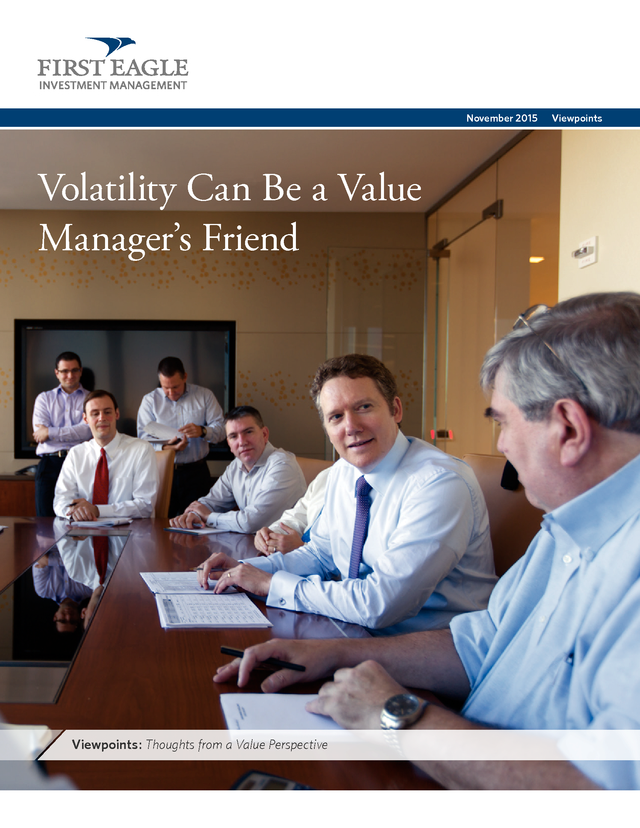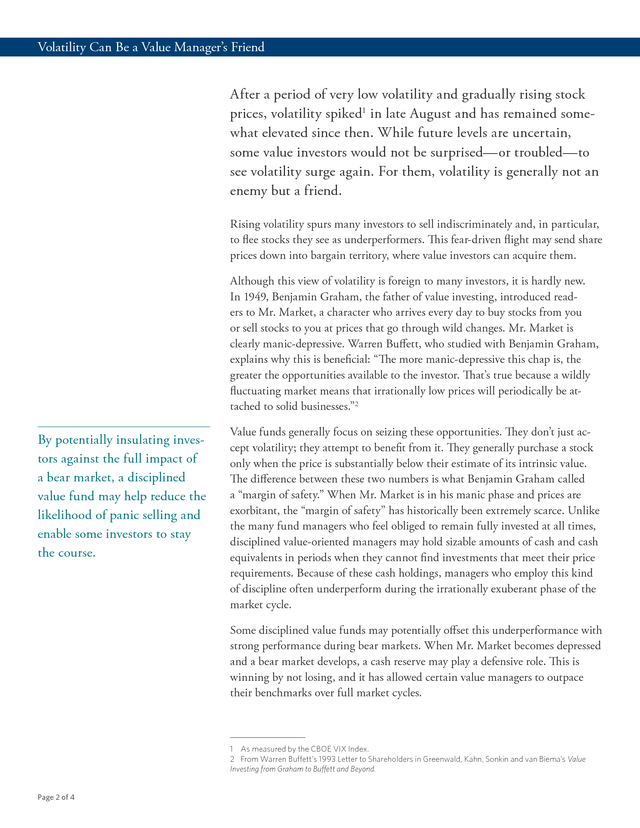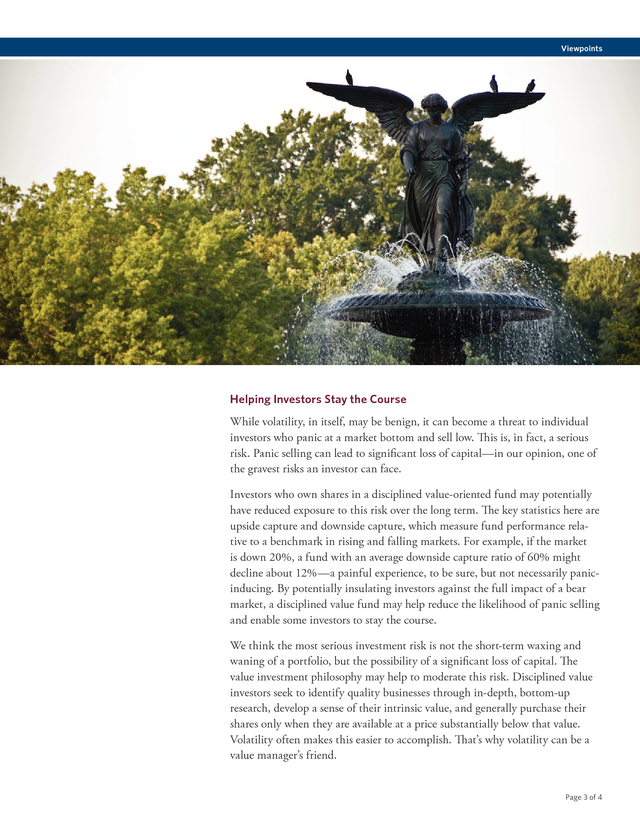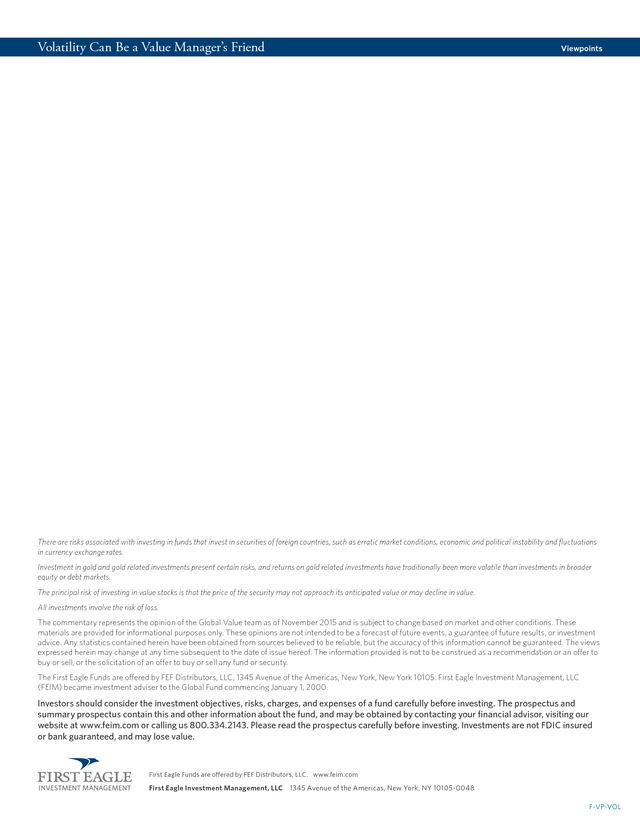Description
November 2015
Volatility Can Be a Value
Manager’s Friend
Viewpoints: Thoughts from a Value Perspective
Viewpoints
. Volatility Can Be a Value Manager’s Friend
After a period of very low volatility and gradually rising stock
prices, volatility spiked1 in late August and has remained somewhat elevated since then. While future levels are uncertain,
some value investors would not be surprised—or troubled—to
see volatility surge again. For them, volatility is generally not an
enemy but a friend.
Rising volatility spurs many investors to sell indiscriminately and, in particular,
to flee stocks they see as underperformers. This fear-driven flight may send share
prices down into bargain territory, where value investors can acquire them.
Although this view of volatility is foreign to many investors, it is hardly new.
In 1949, Benjamin Graham, the father of value investing, introduced readers to Mr.
Market, a character who arrives every day to buy stocks from you or sell stocks to you at prices that go through wild changes. Mr. Market is clearly manic-depressive.
Warren Buffett, who studied with Benjamin Graham, explains why this is beneficial: “The more manic-depressive this chap is, the greater the opportunities available to the investor. That’s true because a wildly fluctuating market means that irrationally low prices will periodically be attached to solid businesses.”2 By potentially insulating investors against the full impact of a bear market, a disciplined value fund may help reduce the likelihood of panic selling and enable some investors to stay the course. Value funds generally focus on seizing these opportunities. They don’t just accept volatility; they attempt to benefit from it.
They generally purchase a stock only when the price is substantially below their estimate of its intrinsic value. The difference between these two numbers is what Benjamin Graham called a “margin of safety.” When Mr. Market is in his manic phase and prices are exorbitant, the “margin of safety” has historically been extremely scarce. Unlike the many fund managers who feel obliged to remain fully invested at all times, disciplined value-oriented managers may hold sizable amounts of cash and cash equivalents in periods when they cannot find investments that meet their price requirements.
Because of these cash holdings, managers who employ this kind of discipline often underperform during the irrationally exuberant phase of the market cycle. Some disciplined value funds may potentially offset this underperformance with strong performance during bear markets. When Mr. Market becomes depressed and a bear market develops, a cash reserve may play a defensive role.
This is winning by not losing, and it has allowed certain value managers to outpace their benchmarks over full market cycles. 1 As measured by the CBOE VIX Index. 2 From Warren Buffett’s 1993 Letter to Shareholders in Greenwald, Kahn, Sonkin and van Biema’s Value Investing from Graham to Buffett and Beyond. Page 2 of 4 . Viewpoints Helping Investors Stay the Course While volatility, in itself, may be benign, it can become a threat to individual investors who panic at a market bottom and sell low. This is, in fact, a serious risk. Panic selling can lead to significant loss of capital—in our opinion, one of the gravest risks an investor can face. Investors who own shares in a disciplined value-oriented fund may potentially have reduced exposure to this risk over the long term. The key statistics here are upside capture and downside capture, which measure fund performance relative to a benchmark in rising and falling markets.
For example, if the market is down 20%, a fund with an average downside capture ratio of 60% might decline about 12%—a painful experience, to be sure, but not necessarily panicinducing. By potentially insulating investors against the full impact of a bear market, a disciplined value fund may help reduce the likelihood of panic selling and enable some investors to stay the course. We think the most serious investment risk is not the short-term waxing and waning of a portfolio, but the possibility of a significant loss of capital. The value investment philosophy may help to moderate this risk.
Disciplined value investors seek to identify quality businesses through in-depth, bottom-up research, develop a sense of their intrinsic value, and generally purchase their shares only when they are available at a price substantially below that value. Volatility often makes this easier to accomplish. That’s why volatility can be a value manager’s friend. Page 3 of 4 . Volatility Can Be a Value Manager’s Friend Viewpoints There are risks associated with investing in funds that invest in securities of foreign countries, such as erratic market conditions, economic and political instability and fluctuations in currency exchange rates. Investment in gold and gold related investments present certain risks, and returns on gold related investments have traditionally been more volatile than investments in broader equity or debt markets. The principal risk of investing in value stocks is that the price of the security may not approach its anticipated value or may decline in value. All investments involve the risk of loss. The commentary represents the opinion of the Global Value team as of November 2015 and is subject to change based on market and other conditions. These materials are provided for informational purposes only. These opinions are not intended to be a forecast of future events, a guarantee of future results, or investment advice. Any statistics contained herein have been obtained from sources believed to be reliable, but the accuracy of this information cannot be guaranteed.
The views expressed herein may change at any time subsequent to the date of issue hereof. The information provided is not to be construed as a recommendation or an offer to buy or sell, or the solicitation of an offer to buy or sell any fund or security. The First Eagle Funds are offered by FEF Distributors, LLC, 1345 Avenue of the Americas, New York, New York 10105. First Eagle Investment Management, LLC (FEIM) became investment adviser to the Global Fund commencing January 1, 2000. Investors should consider the investment objectives, risks, charges, and expenses of a fund carefully before investing.
The prospectus and summary prospectus contain this and other information about the fund, and may be obtained by contacting your financial advisor, visiting our website at www.feim.com or calling us 800.334.2143. Please read the prospectus carefully before investing. Investments are not FDIC insured or bank guaranteed, and may lose value. First Eagle Funds are offered by FEF Distributors, LLC.
www.feim.com First Eagle Investment Management, LLC 1345 Avenue of the Americas, New York, NY 10105-0048 F-VP-VOL .
Market, a character who arrives every day to buy stocks from you or sell stocks to you at prices that go through wild changes. Mr. Market is clearly manic-depressive.
Warren Buffett, who studied with Benjamin Graham, explains why this is beneficial: “The more manic-depressive this chap is, the greater the opportunities available to the investor. That’s true because a wildly fluctuating market means that irrationally low prices will periodically be attached to solid businesses.”2 By potentially insulating investors against the full impact of a bear market, a disciplined value fund may help reduce the likelihood of panic selling and enable some investors to stay the course. Value funds generally focus on seizing these opportunities. They don’t just accept volatility; they attempt to benefit from it.
They generally purchase a stock only when the price is substantially below their estimate of its intrinsic value. The difference between these two numbers is what Benjamin Graham called a “margin of safety.” When Mr. Market is in his manic phase and prices are exorbitant, the “margin of safety” has historically been extremely scarce. Unlike the many fund managers who feel obliged to remain fully invested at all times, disciplined value-oriented managers may hold sizable amounts of cash and cash equivalents in periods when they cannot find investments that meet their price requirements.
Because of these cash holdings, managers who employ this kind of discipline often underperform during the irrationally exuberant phase of the market cycle. Some disciplined value funds may potentially offset this underperformance with strong performance during bear markets. When Mr. Market becomes depressed and a bear market develops, a cash reserve may play a defensive role.
This is winning by not losing, and it has allowed certain value managers to outpace their benchmarks over full market cycles. 1 As measured by the CBOE VIX Index. 2 From Warren Buffett’s 1993 Letter to Shareholders in Greenwald, Kahn, Sonkin and van Biema’s Value Investing from Graham to Buffett and Beyond. Page 2 of 4 . Viewpoints Helping Investors Stay the Course While volatility, in itself, may be benign, it can become a threat to individual investors who panic at a market bottom and sell low. This is, in fact, a serious risk. Panic selling can lead to significant loss of capital—in our opinion, one of the gravest risks an investor can face. Investors who own shares in a disciplined value-oriented fund may potentially have reduced exposure to this risk over the long term. The key statistics here are upside capture and downside capture, which measure fund performance relative to a benchmark in rising and falling markets.
For example, if the market is down 20%, a fund with an average downside capture ratio of 60% might decline about 12%—a painful experience, to be sure, but not necessarily panicinducing. By potentially insulating investors against the full impact of a bear market, a disciplined value fund may help reduce the likelihood of panic selling and enable some investors to stay the course. We think the most serious investment risk is not the short-term waxing and waning of a portfolio, but the possibility of a significant loss of capital. The value investment philosophy may help to moderate this risk.
Disciplined value investors seek to identify quality businesses through in-depth, bottom-up research, develop a sense of their intrinsic value, and generally purchase their shares only when they are available at a price substantially below that value. Volatility often makes this easier to accomplish. That’s why volatility can be a value manager’s friend. Page 3 of 4 . Volatility Can Be a Value Manager’s Friend Viewpoints There are risks associated with investing in funds that invest in securities of foreign countries, such as erratic market conditions, economic and political instability and fluctuations in currency exchange rates. Investment in gold and gold related investments present certain risks, and returns on gold related investments have traditionally been more volatile than investments in broader equity or debt markets. The principal risk of investing in value stocks is that the price of the security may not approach its anticipated value or may decline in value. All investments involve the risk of loss. The commentary represents the opinion of the Global Value team as of November 2015 and is subject to change based on market and other conditions. These materials are provided for informational purposes only. These opinions are not intended to be a forecast of future events, a guarantee of future results, or investment advice. Any statistics contained herein have been obtained from sources believed to be reliable, but the accuracy of this information cannot be guaranteed.
The views expressed herein may change at any time subsequent to the date of issue hereof. The information provided is not to be construed as a recommendation or an offer to buy or sell, or the solicitation of an offer to buy or sell any fund or security. The First Eagle Funds are offered by FEF Distributors, LLC, 1345 Avenue of the Americas, New York, New York 10105. First Eagle Investment Management, LLC (FEIM) became investment adviser to the Global Fund commencing January 1, 2000. Investors should consider the investment objectives, risks, charges, and expenses of a fund carefully before investing.
The prospectus and summary prospectus contain this and other information about the fund, and may be obtained by contacting your financial advisor, visiting our website at www.feim.com or calling us 800.334.2143. Please read the prospectus carefully before investing. Investments are not FDIC insured or bank guaranteed, and may lose value. First Eagle Funds are offered by FEF Distributors, LLC.
www.feim.com First Eagle Investment Management, LLC 1345 Avenue of the Americas, New York, NY 10105-0048 F-VP-VOL .

















